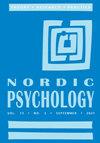Preschool children’s coping and caregiver support in families with maternal substance misuse: A qualitative study
IF 1.1
4区 心理学
Q4 PSYCHOLOGY, MULTIDISCIPLINARY
引用次数: 0
Abstract
Abstract Maternal substance misuse affects caregiving, which influences children’s coping skills. However, little is known about how children of mothers with substance misuse describe their coping in stressful situations. We studied coping and caregiver support among 29 children 4 years of age recruited from a children’s health clinic serving families with maternal substance misuse in Finland. Children completed a revised Attachment Story Completion Task that we examined with qualitative content analysis. We identified children’s experiences with coping in stressful situations with optimal and non-optimal caregiver support. Experiences with optimal caregiver support included (a) empathy, (b) solicitude, (c) intimacy, (d) reassurance, (e) being a role model, (f) concrete help, and (g) shared joy. Ones with non-optimal caregiver support included (a) punishment, (b) abandonment, (c) unresponsiveness, (d) physical aggression, (e) aggressive protection, and (f) parentification. Children’s strategies for coping without caregiver involvement were (a) magic, (b) avoidance, (c) inappropriate laughing, (d) self-reliance, or (e) a lack of strategy. Our findings highlight that preschool children of mothers with substance misuse employ various coping strategies in stressful situations that either include caregiver support or indicate non-optimal support. Children also tended to use maladaptive coping strategies when a caregiver was not involved. Understanding children’s coping with stress in families with maternal substance misuse is essential to supporting their socioemotional development and providing adequate interventions.母体药物滥用家庭中学龄前儿童的应对和照顾者支持:一项定性研究
母亲药物滥用影响照顾行为,进而影响儿童的应对能力。然而,对于药物滥用母亲的孩子如何描述他们在压力情况下的应对方式,人们知之甚少。我们研究了29名4岁儿童的应对和照顾者支持,这些儿童来自芬兰一家为母亲药物滥用家庭服务的儿童健康诊所。孩子们完成了一个修改后的附件故事完成任务,我们用定性内容分析来检验。我们确定了儿童在最佳和非最佳照顾者支持下应对压力情况的经验。最佳照顾者支持的经验包括(a)移情,(b)关怀,(c)亲密,(d)安慰,(e)成为榜样,(f)具体帮助,(g)分享快乐。非最佳照顾者支持包括(a)惩罚,(b)遗弃,(c)无反应,(d)身体攻击,(e)攻击性保护和(f)父母教养。在没有照顾者参与的情况下,儿童的应对策略是(a)魔法,(b)回避,(c)不适当的笑,(d)自力更生,或(e)缺乏策略。我们的研究结果强调,药物滥用母亲的学龄前儿童在压力情况下采用各种应对策略,包括照顾者支持或表明非最佳支持。当没有照顾者参与时,儿童也倾向于使用适应不良的应对策略。了解在母亲滥用药物的家庭中儿童如何应对压力,对于支持他们的社会情感发展和提供适当的干预措施至关重要。
本文章由计算机程序翻译,如有差异,请以英文原文为准。
求助全文
约1分钟内获得全文
求助全文

 求助内容:
求助内容: 应助结果提醒方式:
应助结果提醒方式:


